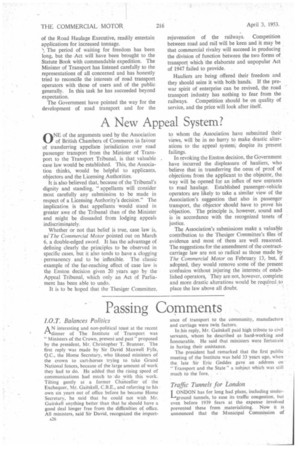A New Appeal System?
Page 28

If you've noticed an error in this article please click here to report it so we can fix it.
ONE of the arguments used by the Association of British Chambers of Commerce in favour of transferring appellate jurisdiction over road passenger transport from the Minister of Transport to the Transport Tribunal, is that valuable case law would be established. This, the Association thinks, would be helpful to applicants, objectors and the Licensing Authorities.
It is also believed that, because of the Tribunal's dignity and standing, "appellants will consider most carefully any submission to be made in respect of a Licensing Authority's decision." The implication is that appellants would stand in greater awe of the Tribunal than of the Minister and might be dissuaded from lodging appeals indiscriminately.
Whether or not that belief is true, case law is, as' The Commercial Motor pointed out on March 6, a double-edged sword. It has the advantage of defining clearly the principles to be observed in specific cases, but it also tends to have a clogging permanency and to be inflexible. The classic example of the far-reaching effect of case law is the Enston decision given 20 years ago by the Appeal Tribunal, which only an Act of Parliament has been able to undo.
It is to be hoped that the Thesiger Committee, to whom the Association have submitted their views, will be in no hurry to make drastic alterations to the appeal system, despite its present failings.
In revoking the Enston decision, the Government have incurred the displeasure of hauliers, who believe that in transferring the onus of proof of objections from the applicant to the objector, the way will be opened for an influx of new entrants to road haulage. Established passenger-vehicle operators are likely to take a similar view of the Association's suggestion that also in passenger transport, the objector should have to prove his objection. The principle is, however, sound and is in accordance with the recognized tenets of justice.
The Association's submissions make a valuable contribution to the Thesiger Committee's files of evidence and most of them are well reasoned. The suggestions for the amendment of the contractcarriage law are not so radical as those made by The Commercial Motor on February 13, but, if adopted, they would remove some of the present confusion without injuring the interests of established operators, They are not, however, complete and more drastic alterations would be required to place the law above all doubt.




























































































